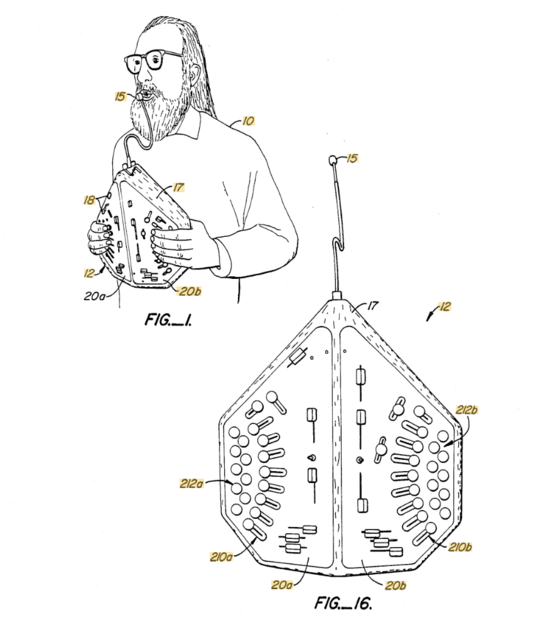Ugo Conti's Whistle-Controlled Synthesizer |
March 1st, 2024 |
| music, tech, whistling |
This is a very configurable whistle-controlled synthesizer that Ugo Conti patented in 1986:
The present invention utilizes the oft-overlooked music-making capability possessed by most people, namely the ability to whistle. Although there are some whistlers who possess astounding technique, and perform publicly, the whistle is generally not a shared form of musical entertainment. The reason is simple—the whistle is too pure in tonal color and too high in pitch to be pleasant to anyone other than the whistler. The whistle tone has none of the rich characteristics displayed by conventional musical instruments or the human singing voice. The result is that most people who whistle do so in the privacy of the shower or while working outdoors.The present invention exploits the whistle's first-mentioned weakness, namely excess purity, as a virtue, in that a whistle is capable of having its fundamental frequency determined very reliably and very quickly. The invention overcomes the second weakness, namely the high pitch, by frequency division.
Reading through the patent was weird: someone sat down with the same problem I had, and 33 years earlier, identified the same key considerations, and came up with really a very similar approach with zero crossing detection and additive synthesis of sine and square waves to turn whistling into something more pleasant.
It does make me wonder more why this didn't catch on: his version is better made than mine, and he tried to sell these. Possibly the problem was just that price was high—a "couple thousand" (~$5.5k today) for the full version and "just over four hundred" (>$1.1+ today) for a simplified model? And then maybe he lost interest and by the time the patent expired in the mid 2000s people had forgotten? Or maybe it's that you do need to be pretty good at whistling to make these sound good (Conti was a two-time second place finisher at the International Whistlers Convention) and most people don't get good enough results for it to be fun?
Sometimes I wonder how much of my enjoyment of this sort of thing is doing something no one else is doing, but at least in this case it was the opposite: learning about this version, an attempt as old as I am, made me more excited about the instrument!
Comment via: facebook, lesswrong, mastodon, substack
